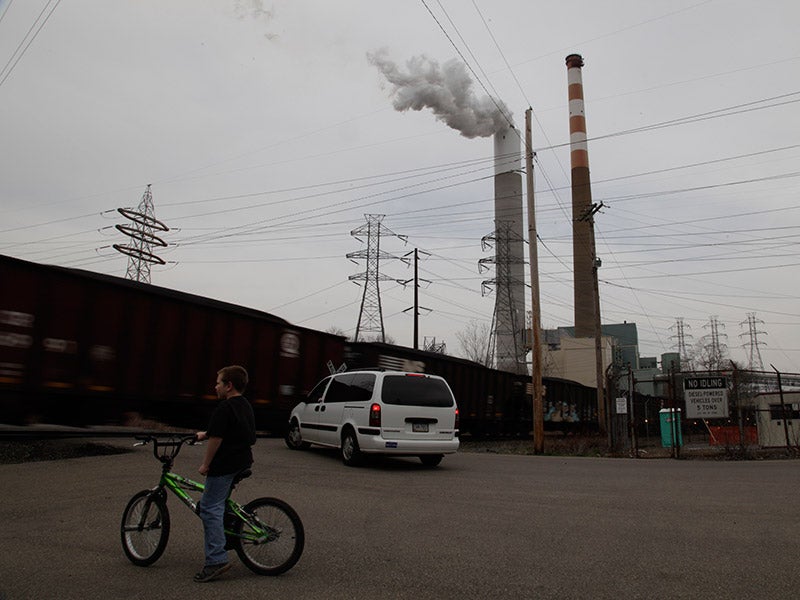Communities Fight Back Against Industry Attacks on New Air Quality Standards
EPA’s updated soot standards under threat from legal challenges, potentially undermining air quality improvements for years to come
Contact
Yesterday, health, environmental, and community organizations, represented by Earthjustice and Clean Air Task Force, filed to intervene in support of the Environmental Protection Agency’s (EPA) recent strengthening of an air standard for fine particulate matter pollution, finalized in February. This landmark standard is designed to protect public health and would address environmental injustices but is being challenged in the U.S. Court of Appeals for the D.C. Circuit by major trade associations and 25 states.
Fine particulate matter, also known as soot or PM2.5, is emitted by fuel combustion and industrial processes. Soot is made up of tiny particles that can penetrate the lungs and bloodstream. Under the Clean Air Act, the EPA has for decades set baseline national air quality standards for six harmful pollutants, including soot. Last month, the EPA updated the annual standard for soot from 12 micrograms per cubic meter to a more protective standard of 9 micrograms per cubic meter.
“In February, the EPA made a crucial move to save lives and tackle air quality injustices for communities of color and low-income groups. But polluters rushed to court to block this life-saving action,” said Earthjustice Attorney Seth Johnson. “Now, diverse health, environmental, and community organizations are stepping up to defend public health and justice in court. With robust scientific backing, we’re ready to show how the Clean Air Act saves lives and protects communities.”
Soot pollution poses severe health risks and disproportionately affects communities of color and low-income communities. The harmful effects of soot pollution include cardiovascular problems, respiratory issues, neurological harms, and lung cancer. According to EPA, the strengthened standards will result in significant public health net benefits that could be as high as $46 billion by 2032.
Yet at their very first opportunity, major trade associations, including the National Association of Manufacturers and the American Petroleum Institute and 25 states led by Kentucky, West Virginia, and Texas, challenged the improved air quality standards. Just this week, two members of Arizona’s legislature and yet another trade association filed a similar challenge. Relying on tired and disproven talking points, their legal arguments cited cost and other concerns when they opposed the EPA’s proposal to improve health protections.
Earthjustice represents the Sierra Club, Northeast Ohio Black Health Coalition, the Rio Grande International Study Center, and NRDC (Natural Resources Defense Council). Clean Air Task Force represents Citizens for Pennsylvania’s Future (PennFuture) and Conservation Law Foundation (CLF).
For maps showing soot and smog pollution in the United States click here.
Quotes from our clients:
“For generations, communities of color have shouldered the burden of environmental injustices, including the toxic impact of soot pollution. It is unconscionable that industry and states are now challenging a vital rule meant to shield our communities,” said Yvonka Hall, Executive Director, Northeast Ohio Black Health Coalition.
“Laredo is the largest land port in the country and Western Hemisphere. Our South Texas city experiences 15,000 to 18,000 diesel commercial truck crossings daily. Many of them idle at the international ports of entry as they wait to cross the border. Dense neighborhoods and schools are built near and around our five international ports. Fine particulate air pollution continues to threaten the health of our South Texas families, underscoring the critical importance of EPA’s soot standard. We will defend this rule, advocating for clean air and justice for deeply impacted communities like ours and many others across the United States,” said Tricia Cortez, executive director, Rio Grande International Study Center.
“The ongoing attacks on vital environmental regulations by industry and states pose a grave threat to our planet and public health. This rule is a crucial milestone in our fight for clean air, particularly for communities disproportionately harmed by preventable soot pollution. We will champion these protections, safeguarding public health and preserving our environment for future generations,” said Patrick Drupp, Director of Climate Policy, Sierra Club.
“We cannot let other states and polluting industry groups threaten the critical health protections that EPA has established with the new soot rule,” said Abigail M. Jones, PennFuture’s Vice President of Legal and Policy. “This more stringent standard for particulate matter will lead to improved air quality and health for millions of Pennsylvanians who simply cannot afford any delay.”
“Standing by while polluters continue to suffocate our loved ones with toxic particles is unacceptable – which is why the EPA’s move to clean up air quality was so important,” said Shannon Laun, Vice President of CLF Connecticut. “We are ready to show up and fight for our health in court – because we’ll never compromise when it comes to the safety of our neighbors, communities, and the low-income and Black and Brown families that continue to shoulder the worst of these toxins.”

Additional Resources
About Earthjustice
Earthjustice is the premier nonprofit environmental law organization. We wield the power of law and the strength of partnership to protect people's health, to preserve magnificent places and wildlife, to advance clean energy, and to combat climate change. We are here because the earth needs a good lawyer.